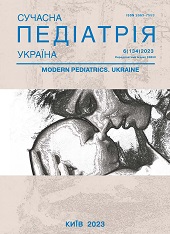Immune disorders peculiarities in girls with relapses of chronic non-specific inflammatory diseases of the genital organs
DOI:
https://doi.org/10.15574/SP.2023.134.48Keywords:
immunogram, immunodeficiency, vaginitis, microbiome, immunocompromised, prevention of relapses, girls, womenAbstract
Nonspecific inflammatory diseases of the female genital organs (NIDFGO) affect women throughout their lives and are an important medical and social problem associated with a decrease in a woman's reproductive potential.
Purpose - to study the immune status of girls with HCV in comparison with changes in adult women in order to improve algorithms for the diagnosis and treatment of inflammatory vaginal lesions depending on age.
Materials and methods. In a prospective, single-center controlled and non-randomized study, 69 girls were involved: 55 patients with NIDFGO, who had a different frequency (from 1 to 4 or more) of disease recurrence during 1 year of observation, and 14 healthy girls of the control group. All study participants underwent a standard gynecological examination and laboratory screening. The research was carried out in accordance with the principles of the Helsinki Declaration. The study protocol was approved by the Local Ethics Committee of the Bogomolets National Medical University. The informed consent of the children’s parents was obtained for the conducting the studies. Statistical analysis was performed using the IBM SPSS Statistics 23 package and the MedStat program. Results in groups were compared using Kruskal-Wallis, Dunn, or Mann-Whitney tests with Bonferroni correction.
Results. Selective deficiencies of IgE and NKT-cells are the main immune disorders in patients with , NIDFGO of both age groups. Deficiencies of IgA, C3 component of the complement system and qualitative phagocytic disorders are registered only in girls, while in adult women, deficiency of C4 component of complement, CD8+ cytotoxic T-lymphocytes and NK cells predominate.
Conclusions. The opposite direction of changes in the content of the IgE molecule and the number of NKT cells in the blood in patients with NIDFGO in different age groups, with the preservation of the ratio of results in subgroups with different frequency of relapses, indicates the need for a differentiated approach to the diagnosis, treatment and prevention of immune disorders in people with recurrent NIDFGO in different age groups.
No conflict of interests was declared by the authors.
References
Beyitler I, Kavukcu S. (2017). Clinical presentation, diagnosis and treatment of vulvovaginitis in girls: a current approach and review of the literature. World J Pediatr. 13: 101-105. https://doi.org/10.1007/s12519-016-0078-y; PMid:28083751
Davydenko КІ, Maltsev DV, Batman YuA, Natrus LV. (2022). Study of the immune disorders in nonspecific chronic inflammatory diseases of the genital organs. Fiziologichnyi Zhurnal. 68; 3: 68-77. URL: https://fz.kiev.ua/index.php?list1=147. https://doi.org/10.15407/fz68.03.068
Davydenko КІ, Maltsev DV, Natrus LV. (2023). Indicators of immune status in women with different recurrence rates of nonspecific inflammatory diseases of the genital organs. Zaporozhye medical journal. 25 (3): 248-254. https://doi.org/10.14739/2310-1210.2023.3.269374
Hughes SM, Levy CN, Calienes FL et al. (2022). Starting to have sexual intercourse is associated with increases in cervicovaginal immune mediators in young women: a prospective study and meta-analysis. Elife. 25; 11. https://doi.org/10.7554/eLife.78565; PMid:36281966 PMCid:PMC9596159
Imataki O, Heike Y, Makiyama H et al. (2008). Insufficient ex vivo expansion of Valpha24(±) natural killer T cells in malignant lymphoma patients related to the suppressed expression of CD1d molecules on CD14(±) cells. Cytotherapy. 10 (5): 497-506. https://doi.org/10.1080/14653240802072747; PMid:18608348
Lehtoranta L, Ala-Jaakkola R, Laitila A, Maukonen J. (2022, Apr 8). Healthy Vaginal Microbiota and Influence of Probiotics Across the Female Life Span. Front Microbiol. 13: 819958. https://doi.org/10.3389/fmicb.2022.819958; PMid:35464937 PMCid:PMC9024219
Okumura A, Ishikawa T, Maeno T et al. (2005). Changes in natural killer T cells subsets during therapy in type C hepatitis and hepatocellular carcinoma. Hepatol. Res. 32 (4): 213-217. https://doi.org/10.1016/j.hepres.2005.02.008; PMid:15905121
Ranđeloviė G, Mladenović V, Ristić L et al. (2012). Microbiological aspects of vulvovaginitis in prepubertal girls. Eur. J. Pediatr. 171: 1203-1208. https://doi.org/10.1007/s00431-012-1705-9; PMid:22383074
Strzelec M, Detka J, Mieszczak P, Sobocińska MK, Majka M. (2023, Mar 9). Immunomodulation-a general review of the current state-of-the-art and new therapeutic strategies for targeting the immune system. Front Immunol. 14: 1127704. https://doi.org/10.3389/fimmu.2023.1127704; PMid:36969193 PMCid:PMC10033545
Sugahara S, Ichida T, Yamagiwa S et al. (2002). Thymosin-alpha1 increases intrahepatic NKT cells and CTLs in patients with chronic hepatitis B. Hepatol. Res. 24 (4): 346-354. https://doi.org/10.1016/S1386-6346(02)00145-6; PMid:12479932
Tsaryk VV. (2014, Dec). Treatment of Refractory Rhinosinusitis In Patients With IgE-Deficiency. Lik Sprava. 12: 3-10. PMID: 26638461. https://doi.org/10.31640/LS-2014-12-01
Villa P, Cipolla C, D'Ippolito S, Amar ID et al. (2020). The interplay between immune system and microbiota in gynecological diseases: a narrative review. Eur Rev Med Pharmacol Sci. 24 (10): 5676-5690. doi: 10.26355/eurrev_202005_21359.
Yamagiwa S, Matsuda Y, Ichida T et al. (2008). Sustained response to interferon-alpha plus ribavirin therapy for chronic hepatitis C is closely associated with increased dynamism of intrahepatic natural killer and natural killer T cells. Hepatol. Res. 38 (7): 664-672. https://doi.org/10.1111/j.1872-034X.2008.00317.x; PMid:18328072
Downloads
Published
Issue
Section
License
Copyright (c) 2023 Modern pediatrics. Ukraine

This work is licensed under a Creative Commons Attribution-NonCommercial 4.0 International License.
The policy of the Journal “MODERN PEDIATRICS. UKRAINE” is compatible with the vast majority of funders' of open access and self-archiving policies. The journal provides immediate open access route being convinced that everyone – not only scientists - can benefit from research results, and publishes articles exclusively under open access distribution, with a Creative Commons Attribution-Noncommercial 4.0 international license (СС BY-NC).
Authors transfer the copyright to the Journal “MODERN PEDIATRICS. UKRAINE” when the manuscript is accepted for publication. Authors declare that this manuscript has not been published nor is under simultaneous consideration for publication elsewhere. After publication, the articles become freely available on-line to the public.
Readers have the right to use, distribute, and reproduce articles in any medium, provided the articles and the journal are properly cited.
The use of published materials for commercial purposes is strongly prohibited.

